Financial Accounting Theory Report for ACCT6007 Module
VerifiedAdded on 2022/09/26
|8
|1552
|21
Report
AI Summary
This report delves into financial accounting theory, addressing key concepts and frameworks within the field. The report begins by exploring the Australian Accounting Standard Board (AASB) conceptual framework, highlighting the significance of relevance and faithful representation in financial reporting. It then moves on to discuss positive and normative accounting theories, examining their roles in financial data analysis and decision-making. The report provides a case study of 2DayFM radio network to illustrate the practical application of positive accounting theory in managing expenses and improving revenue. Furthermore, it analyzes public interest and capture theories, explaining how government regulations and market forces interact. The report concludes by discussing the impact of public actions and interests on corporate social responsibility and market dynamics, using the Australian government's inquiry into corporate social responsibility as an example. The report utilizes references from various academic sources to support its arguments and analysis.
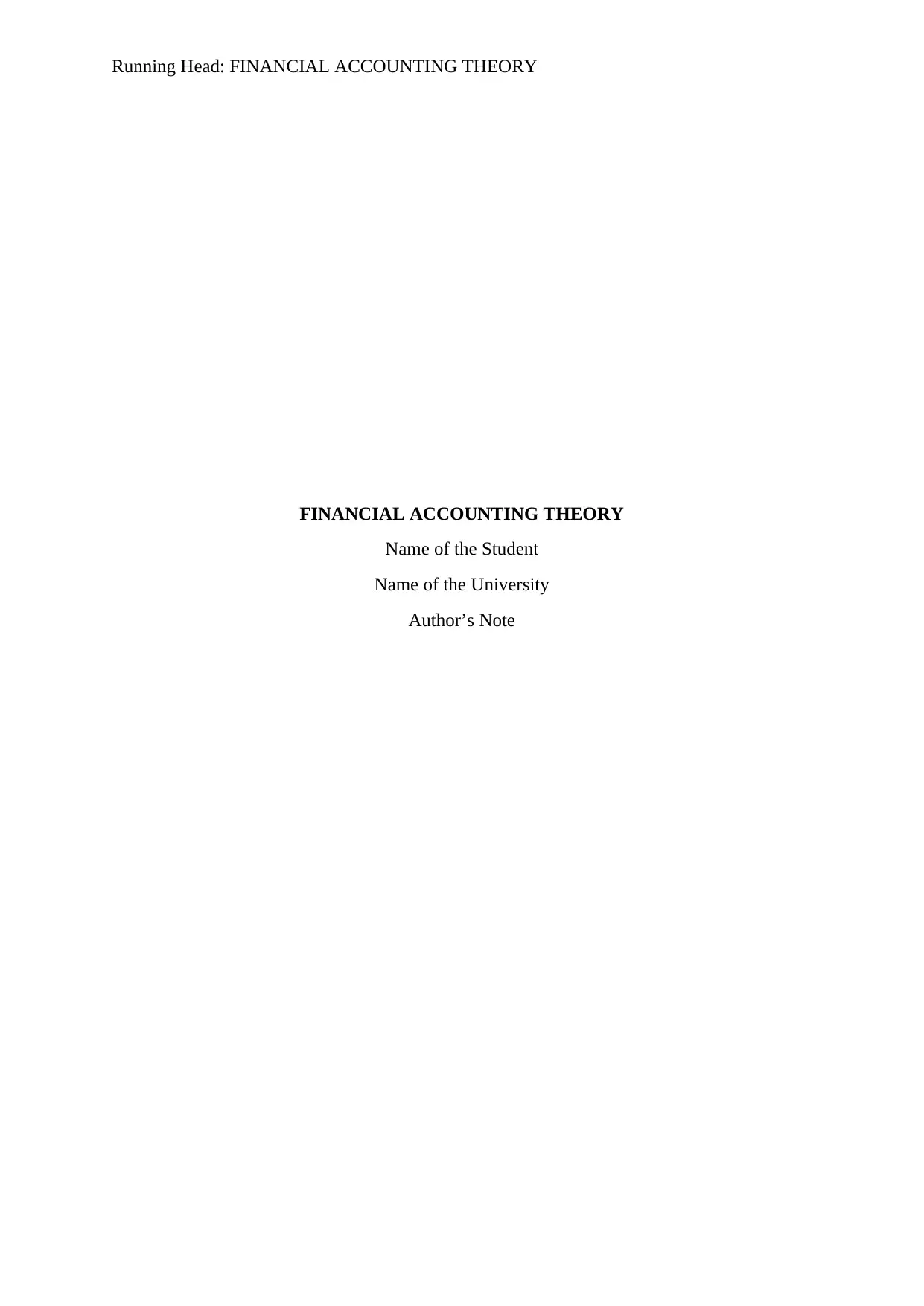
Running Head: FINANCIAL ACCOUNTING THEORY
FINANCIAL ACCOUNTING THEORY
Name of the Student
Name of the University
Author’s Note
FINANCIAL ACCOUNTING THEORY
Name of the Student
Name of the University
Author’s Note
Paraphrase This Document
Need a fresh take? Get an instant paraphrase of this document with our AI Paraphraser
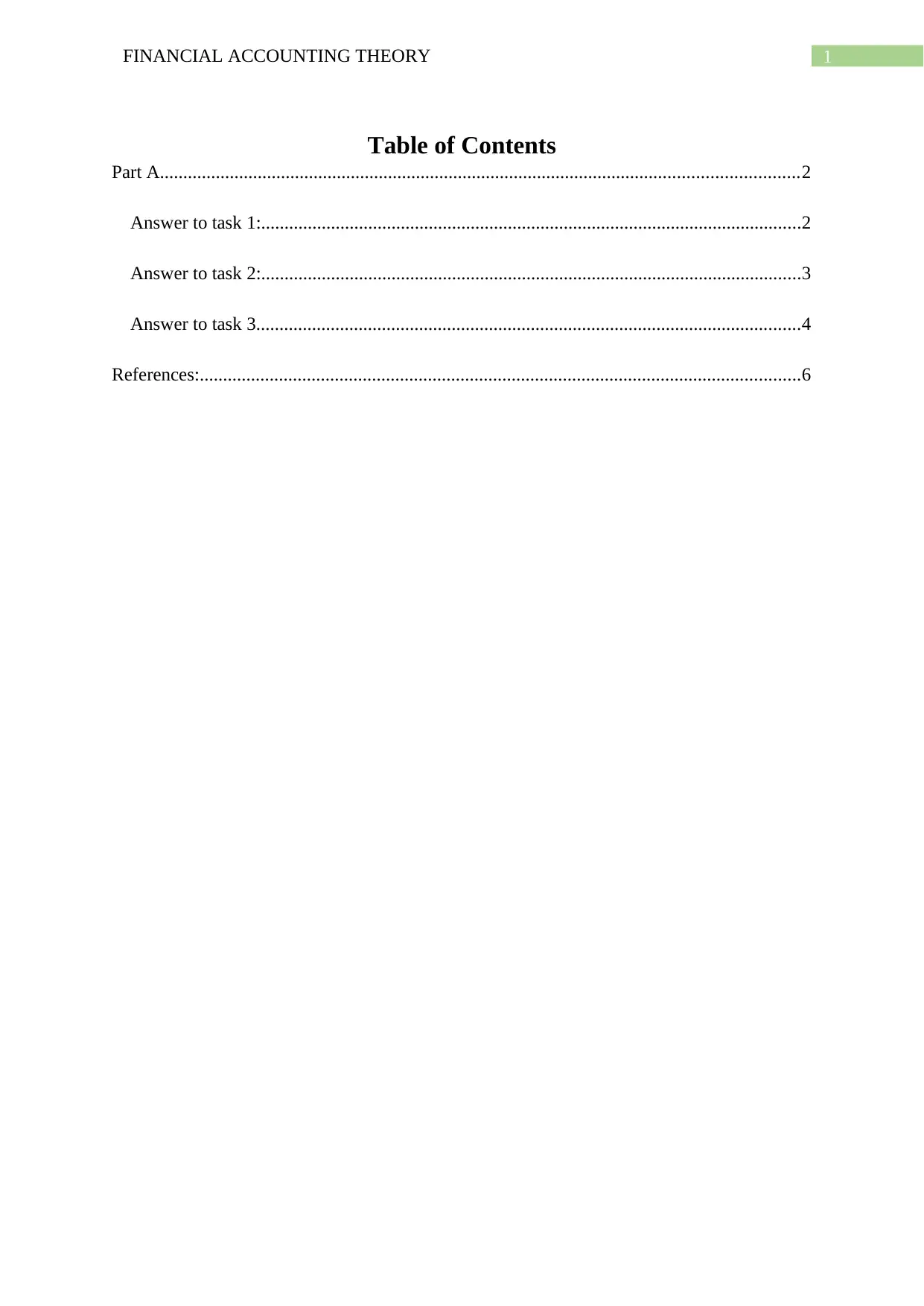
1FINANCIAL ACCOUNTING THEORY
Table of Contents
Part A.........................................................................................................................................2
Answer to task 1:....................................................................................................................2
Answer to task 2:....................................................................................................................3
Answer to task 3.....................................................................................................................4
References:.................................................................................................................................6
Table of Contents
Part A.........................................................................................................................................2
Answer to task 1:....................................................................................................................2
Answer to task 2:....................................................................................................................3
Answer to task 3.....................................................................................................................4
References:.................................................................................................................................6
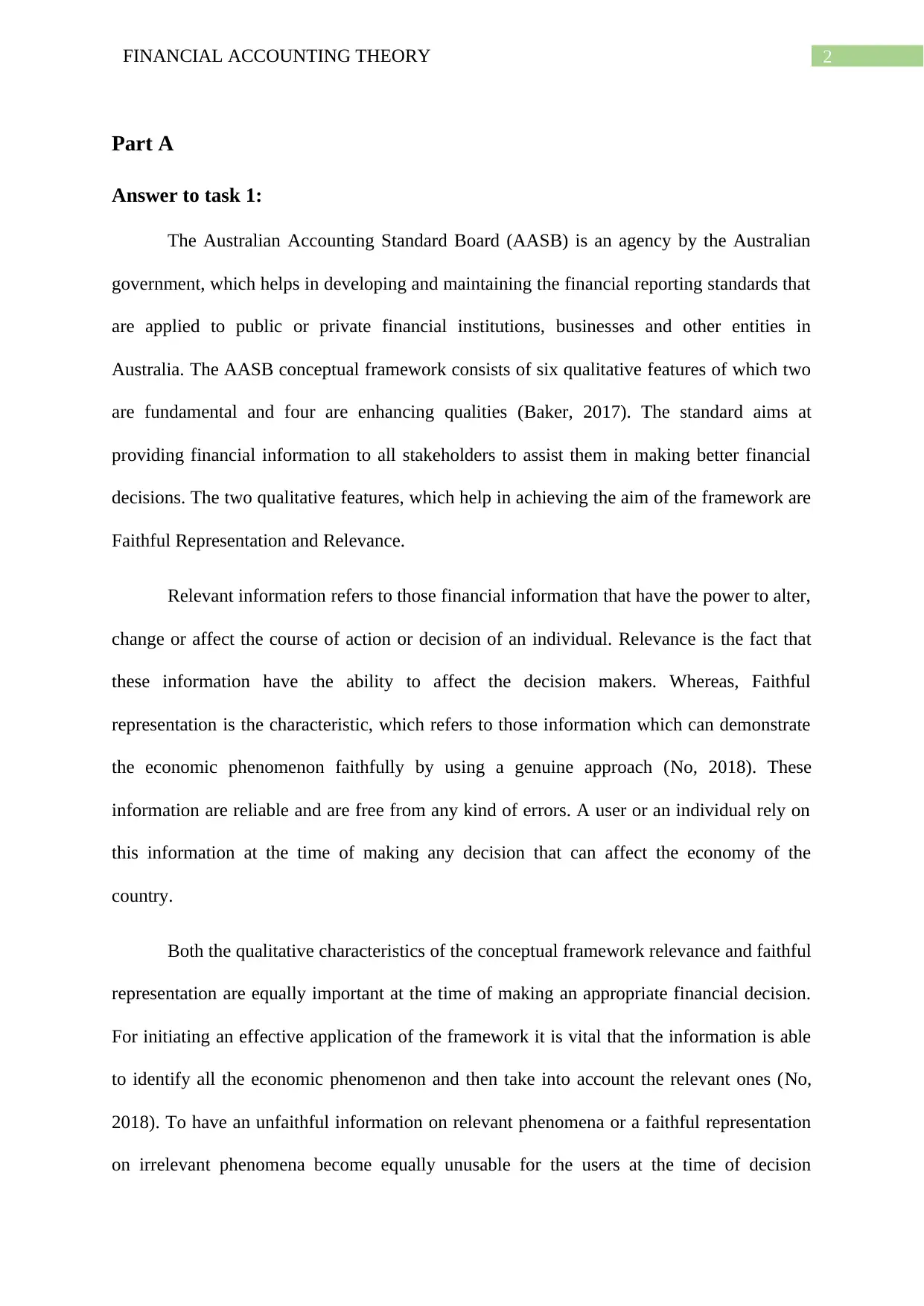
2FINANCIAL ACCOUNTING THEORY
Part A
Answer to task 1:
The Australian Accounting Standard Board (AASB) is an agency by the Australian
government, which helps in developing and maintaining the financial reporting standards that
are applied to public or private financial institutions, businesses and other entities in
Australia. The AASB conceptual framework consists of six qualitative features of which two
are fundamental and four are enhancing qualities (Baker, 2017). The standard aims at
providing financial information to all stakeholders to assist them in making better financial
decisions. The two qualitative features, which help in achieving the aim of the framework are
Faithful Representation and Relevance.
Relevant information refers to those financial information that have the power to alter,
change or affect the course of action or decision of an individual. Relevance is the fact that
these information have the ability to affect the decision makers. Whereas, Faithful
representation is the characteristic, which refers to those information which can demonstrate
the economic phenomenon faithfully by using a genuine approach (No, 2018). These
information are reliable and are free from any kind of errors. A user or an individual rely on
this information at the time of making any decision that can affect the economy of the
country.
Both the qualitative characteristics of the conceptual framework relevance and faithful
representation are equally important at the time of making an appropriate financial decision.
For initiating an effective application of the framework it is vital that the information is able
to identify all the economic phenomenon and then take into account the relevant ones (No,
2018). To have an unfaithful information on relevant phenomena or a faithful representation
on irrelevant phenomena become equally unusable for the users at the time of decision
Part A
Answer to task 1:
The Australian Accounting Standard Board (AASB) is an agency by the Australian
government, which helps in developing and maintaining the financial reporting standards that
are applied to public or private financial institutions, businesses and other entities in
Australia. The AASB conceptual framework consists of six qualitative features of which two
are fundamental and four are enhancing qualities (Baker, 2017). The standard aims at
providing financial information to all stakeholders to assist them in making better financial
decisions. The two qualitative features, which help in achieving the aim of the framework are
Faithful Representation and Relevance.
Relevant information refers to those financial information that have the power to alter,
change or affect the course of action or decision of an individual. Relevance is the fact that
these information have the ability to affect the decision makers. Whereas, Faithful
representation is the characteristic, which refers to those information which can demonstrate
the economic phenomenon faithfully by using a genuine approach (No, 2018). These
information are reliable and are free from any kind of errors. A user or an individual rely on
this information at the time of making any decision that can affect the economy of the
country.
Both the qualitative characteristics of the conceptual framework relevance and faithful
representation are equally important at the time of making an appropriate financial decision.
For initiating an effective application of the framework it is vital that the information is able
to identify all the economic phenomenon and then take into account the relevant ones (No,
2018). To have an unfaithful information on relevant phenomena or a faithful representation
on irrelevant phenomena become equally unusable for the users at the time of decision
⊘ This is a preview!⊘
Do you want full access?
Subscribe today to unlock all pages.

Trusted by 1+ million students worldwide
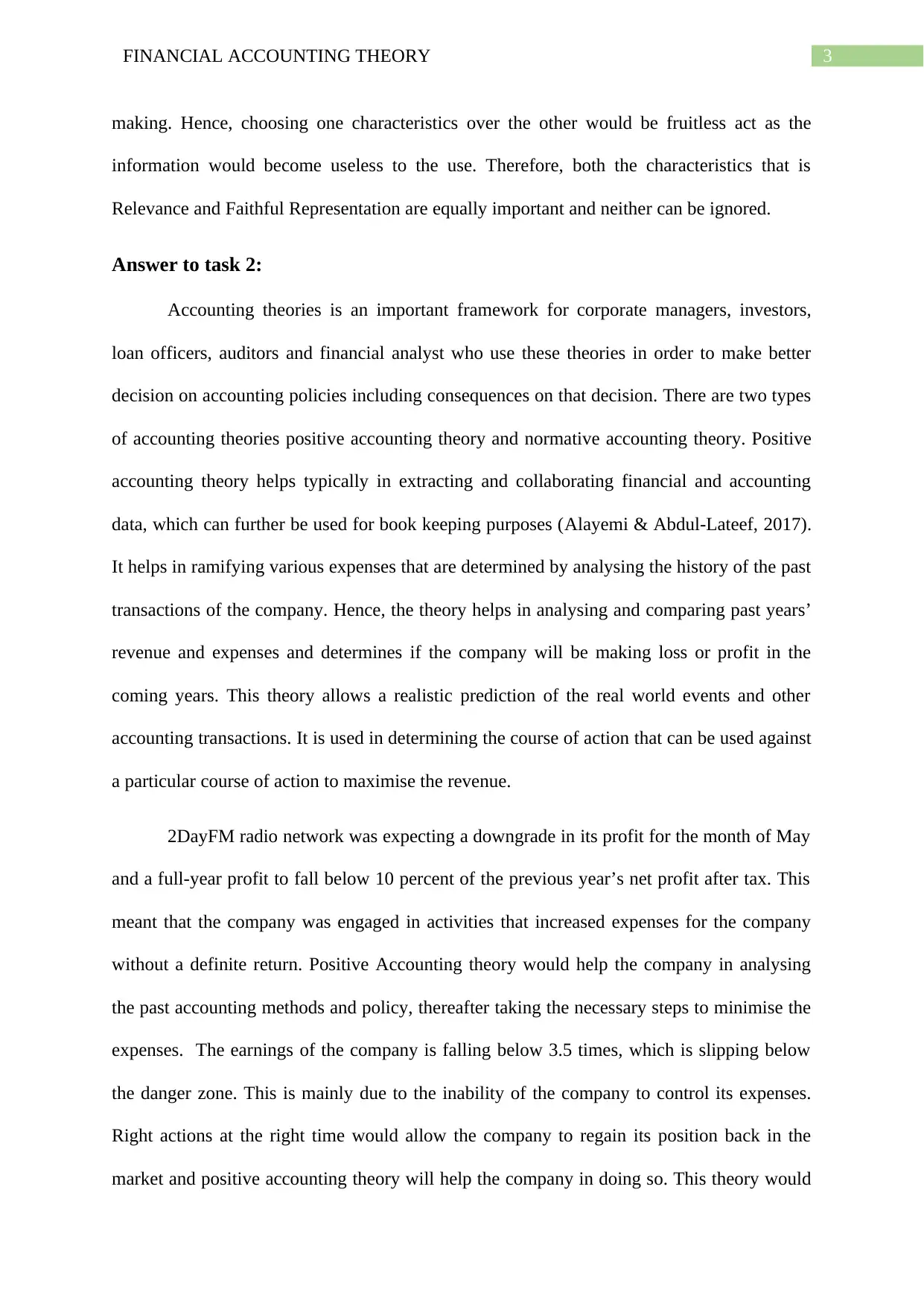
3FINANCIAL ACCOUNTING THEORY
making. Hence, choosing one characteristics over the other would be fruitless act as the
information would become useless to the use. Therefore, both the characteristics that is
Relevance and Faithful Representation are equally important and neither can be ignored.
Answer to task 2:
Accounting theories is an important framework for corporate managers, investors,
loan officers, auditors and financial analyst who use these theories in order to make better
decision on accounting policies including consequences on that decision. There are two types
of accounting theories positive accounting theory and normative accounting theory. Positive
accounting theory helps typically in extracting and collaborating financial and accounting
data, which can further be used for book keeping purposes (Alayemi & Abdul-Lateef, 2017).
It helps in ramifying various expenses that are determined by analysing the history of the past
transactions of the company. Hence, the theory helps in analysing and comparing past years’
revenue and expenses and determines if the company will be making loss or profit in the
coming years. This theory allows a realistic prediction of the real world events and other
accounting transactions. It is used in determining the course of action that can be used against
a particular course of action to maximise the revenue.
2DayFM radio network was expecting a downgrade in its profit for the month of May
and a full-year profit to fall below 10 percent of the previous year’s net profit after tax. This
meant that the company was engaged in activities that increased expenses for the company
without a definite return. Positive Accounting theory would help the company in analysing
the past accounting methods and policy, thereafter taking the necessary steps to minimise the
expenses. The earnings of the company is falling below 3.5 times, which is slipping below
the danger zone. This is mainly due to the inability of the company to control its expenses.
Right actions at the right time would allow the company to regain its position back in the
market and positive accounting theory will help the company in doing so. This theory would
making. Hence, choosing one characteristics over the other would be fruitless act as the
information would become useless to the use. Therefore, both the characteristics that is
Relevance and Faithful Representation are equally important and neither can be ignored.
Answer to task 2:
Accounting theories is an important framework for corporate managers, investors,
loan officers, auditors and financial analyst who use these theories in order to make better
decision on accounting policies including consequences on that decision. There are two types
of accounting theories positive accounting theory and normative accounting theory. Positive
accounting theory helps typically in extracting and collaborating financial and accounting
data, which can further be used for book keeping purposes (Alayemi & Abdul-Lateef, 2017).
It helps in ramifying various expenses that are determined by analysing the history of the past
transactions of the company. Hence, the theory helps in analysing and comparing past years’
revenue and expenses and determines if the company will be making loss or profit in the
coming years. This theory allows a realistic prediction of the real world events and other
accounting transactions. It is used in determining the course of action that can be used against
a particular course of action to maximise the revenue.
2DayFM radio network was expecting a downgrade in its profit for the month of May
and a full-year profit to fall below 10 percent of the previous year’s net profit after tax. This
meant that the company was engaged in activities that increased expenses for the company
without a definite return. Positive Accounting theory would help the company in analysing
the past accounting methods and policy, thereafter taking the necessary steps to minimise the
expenses. The earnings of the company is falling below 3.5 times, which is slipping below
the danger zone. This is mainly due to the inability of the company to control its expenses.
Right actions at the right time would allow the company to regain its position back in the
market and positive accounting theory will help the company in doing so. This theory would
Paraphrase This Document
Need a fresh take? Get an instant paraphrase of this document with our AI Paraphraser
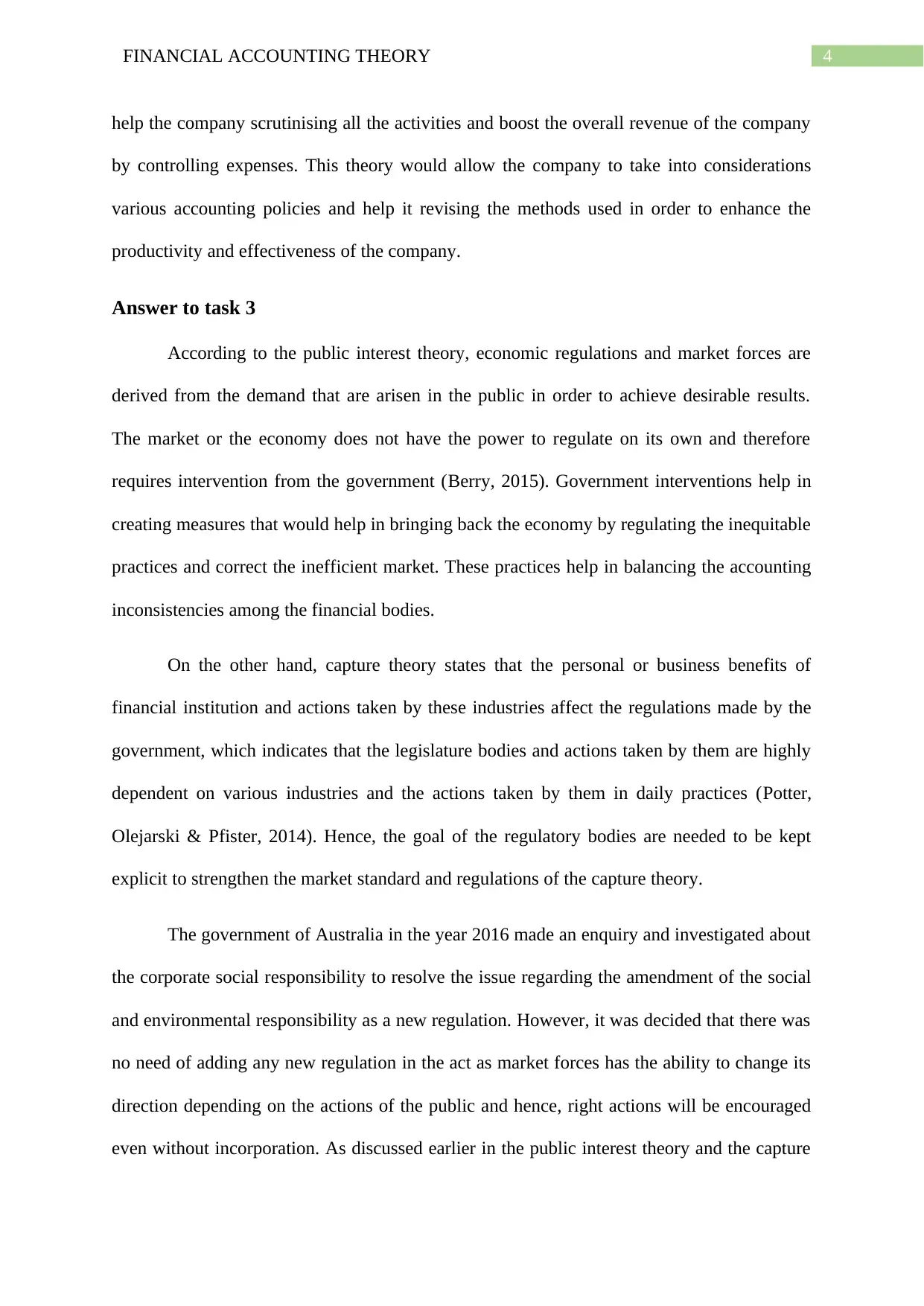
4FINANCIAL ACCOUNTING THEORY
help the company scrutinising all the activities and boost the overall revenue of the company
by controlling expenses. This theory would allow the company to take into considerations
various accounting policies and help it revising the methods used in order to enhance the
productivity and effectiveness of the company.
Answer to task 3
According to the public interest theory, economic regulations and market forces are
derived from the demand that are arisen in the public in order to achieve desirable results.
The market or the economy does not have the power to regulate on its own and therefore
requires intervention from the government (Berry, 2015). Government interventions help in
creating measures that would help in bringing back the economy by regulating the inequitable
practices and correct the inefficient market. These practices help in balancing the accounting
inconsistencies among the financial bodies.
On the other hand, capture theory states that the personal or business benefits of
financial institution and actions taken by these industries affect the regulations made by the
government, which indicates that the legislature bodies and actions taken by them are highly
dependent on various industries and the actions taken by them in daily practices (Potter,
Olejarski & Pfister, 2014). Hence, the goal of the regulatory bodies are needed to be kept
explicit to strengthen the market standard and regulations of the capture theory.
The government of Australia in the year 2016 made an enquiry and investigated about
the corporate social responsibility to resolve the issue regarding the amendment of the social
and environmental responsibility as a new regulation. However, it was decided that there was
no need of adding any new regulation in the act as market forces has the ability to change its
direction depending on the actions of the public and hence, right actions will be encouraged
even without incorporation. As discussed earlier in the public interest theory and the capture
help the company scrutinising all the activities and boost the overall revenue of the company
by controlling expenses. This theory would allow the company to take into considerations
various accounting policies and help it revising the methods used in order to enhance the
productivity and effectiveness of the company.
Answer to task 3
According to the public interest theory, economic regulations and market forces are
derived from the demand that are arisen in the public in order to achieve desirable results.
The market or the economy does not have the power to regulate on its own and therefore
requires intervention from the government (Berry, 2015). Government interventions help in
creating measures that would help in bringing back the economy by regulating the inequitable
practices and correct the inefficient market. These practices help in balancing the accounting
inconsistencies among the financial bodies.
On the other hand, capture theory states that the personal or business benefits of
financial institution and actions taken by these industries affect the regulations made by the
government, which indicates that the legislature bodies and actions taken by them are highly
dependent on various industries and the actions taken by them in daily practices (Potter,
Olejarski & Pfister, 2014). Hence, the goal of the regulatory bodies are needed to be kept
explicit to strengthen the market standard and regulations of the capture theory.
The government of Australia in the year 2016 made an enquiry and investigated about
the corporate social responsibility to resolve the issue regarding the amendment of the social
and environmental responsibility as a new regulation. However, it was decided that there was
no need of adding any new regulation in the act as market forces has the ability to change its
direction depending on the actions of the public and hence, right actions will be encouraged
even without incorporation. As discussed earlier in the public interest theory and the capture
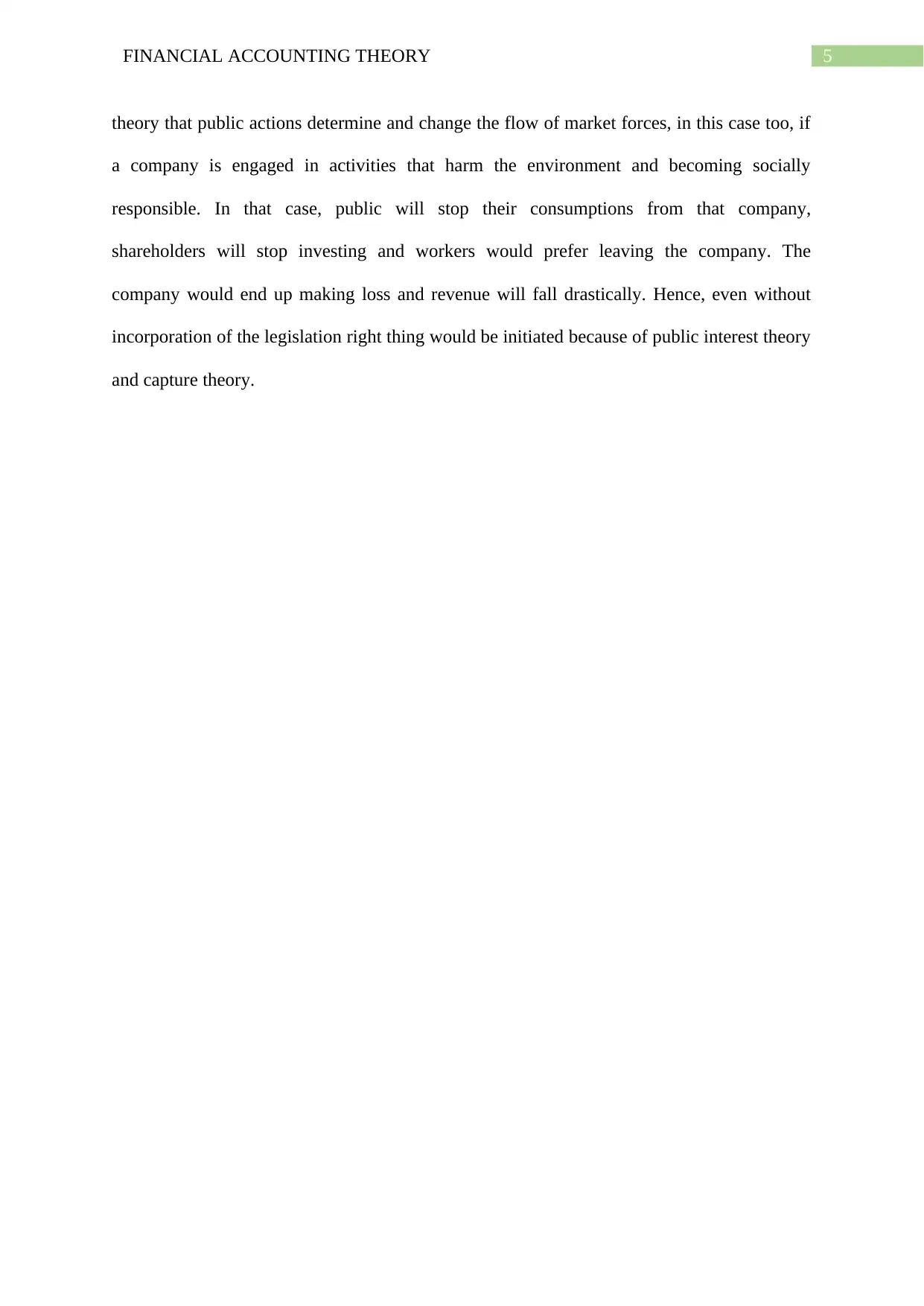
5FINANCIAL ACCOUNTING THEORY
theory that public actions determine and change the flow of market forces, in this case too, if
a company is engaged in activities that harm the environment and becoming socially
responsible. In that case, public will stop their consumptions from that company,
shareholders will stop investing and workers would prefer leaving the company. The
company would end up making loss and revenue will fall drastically. Hence, even without
incorporation of the legislation right thing would be initiated because of public interest theory
and capture theory.
theory that public actions determine and change the flow of market forces, in this case too, if
a company is engaged in activities that harm the environment and becoming socially
responsible. In that case, public will stop their consumptions from that company,
shareholders will stop investing and workers would prefer leaving the company. The
company would end up making loss and revenue will fall drastically. Hence, even without
incorporation of the legislation right thing would be initiated because of public interest theory
and capture theory.
⊘ This is a preview!⊘
Do you want full access?
Subscribe today to unlock all pages.

Trusted by 1+ million students worldwide
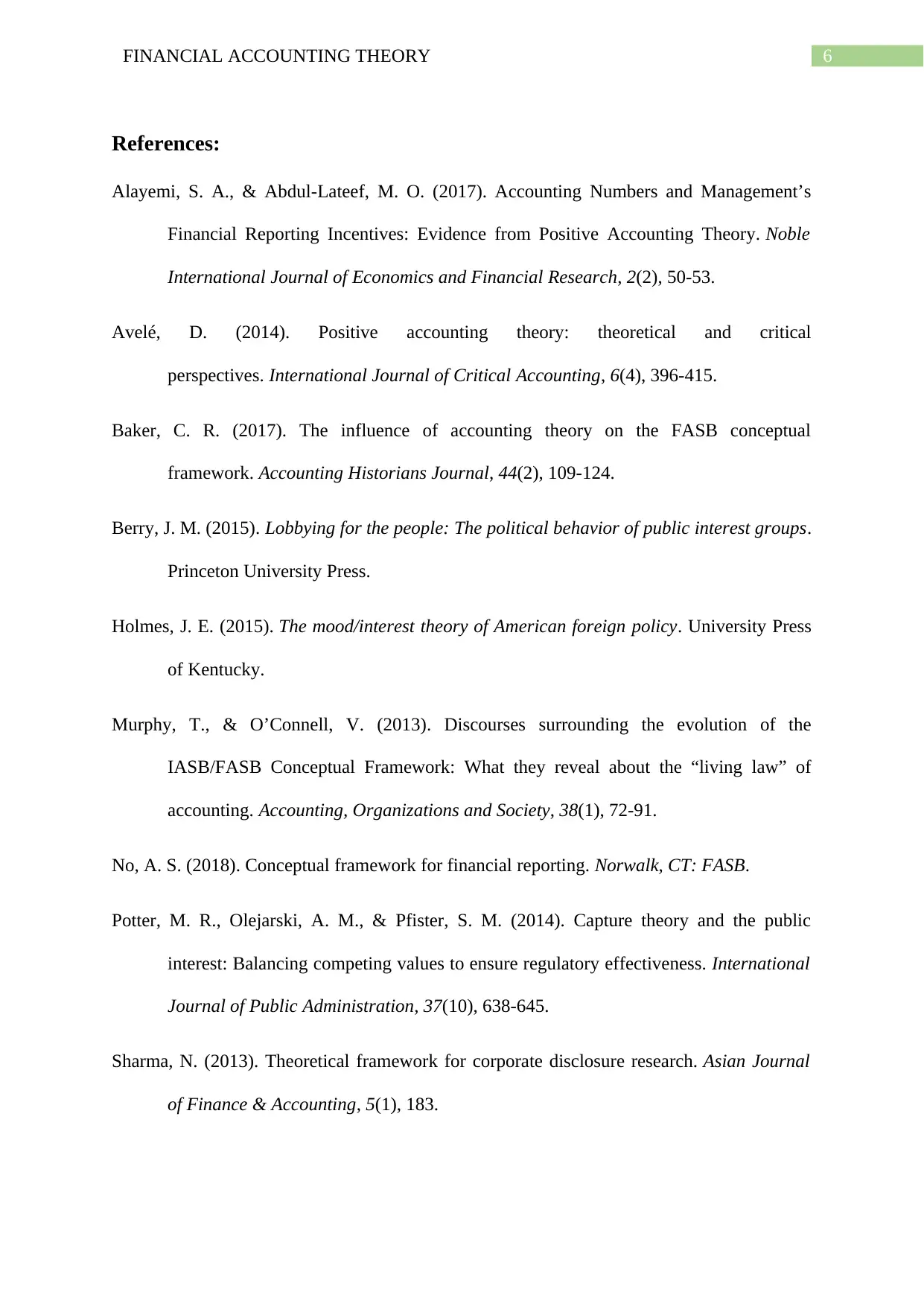
6FINANCIAL ACCOUNTING THEORY
References:
Alayemi, S. A., & Abdul-Lateef, M. O. (2017). Accounting Numbers and Management’s
Financial Reporting Incentives: Evidence from Positive Accounting Theory. Noble
International Journal of Economics and Financial Research, 2(2), 50-53.
Avelé, D. (2014). Positive accounting theory: theoretical and critical
perspectives. International Journal of Critical Accounting, 6(4), 396-415.
Baker, C. R. (2017). The influence of accounting theory on the FASB conceptual
framework. Accounting Historians Journal, 44(2), 109-124.
Berry, J. M. (2015). Lobbying for the people: The political behavior of public interest groups.
Princeton University Press.
Holmes, J. E. (2015). The mood/interest theory of American foreign policy. University Press
of Kentucky.
Murphy, T., & O’Connell, V. (2013). Discourses surrounding the evolution of the
IASB/FASB Conceptual Framework: What they reveal about the “living law” of
accounting. Accounting, Organizations and Society, 38(1), 72-91.
No, A. S. (2018). Conceptual framework for financial reporting. Norwalk, CT: FASB.
Potter, M. R., Olejarski, A. M., & Pfister, S. M. (2014). Capture theory and the public
interest: Balancing competing values to ensure regulatory effectiveness. International
Journal of Public Administration, 37(10), 638-645.
Sharma, N. (2013). Theoretical framework for corporate disclosure research. Asian Journal
of Finance & Accounting, 5(1), 183.
References:
Alayemi, S. A., & Abdul-Lateef, M. O. (2017). Accounting Numbers and Management’s
Financial Reporting Incentives: Evidence from Positive Accounting Theory. Noble
International Journal of Economics and Financial Research, 2(2), 50-53.
Avelé, D. (2014). Positive accounting theory: theoretical and critical
perspectives. International Journal of Critical Accounting, 6(4), 396-415.
Baker, C. R. (2017). The influence of accounting theory on the FASB conceptual
framework. Accounting Historians Journal, 44(2), 109-124.
Berry, J. M. (2015). Lobbying for the people: The political behavior of public interest groups.
Princeton University Press.
Holmes, J. E. (2015). The mood/interest theory of American foreign policy. University Press
of Kentucky.
Murphy, T., & O’Connell, V. (2013). Discourses surrounding the evolution of the
IASB/FASB Conceptual Framework: What they reveal about the “living law” of
accounting. Accounting, Organizations and Society, 38(1), 72-91.
No, A. S. (2018). Conceptual framework for financial reporting. Norwalk, CT: FASB.
Potter, M. R., Olejarski, A. M., & Pfister, S. M. (2014). Capture theory and the public
interest: Balancing competing values to ensure regulatory effectiveness. International
Journal of Public Administration, 37(10), 638-645.
Sharma, N. (2013). Theoretical framework for corporate disclosure research. Asian Journal
of Finance & Accounting, 5(1), 183.
Paraphrase This Document
Need a fresh take? Get an instant paraphrase of this document with our AI Paraphraser
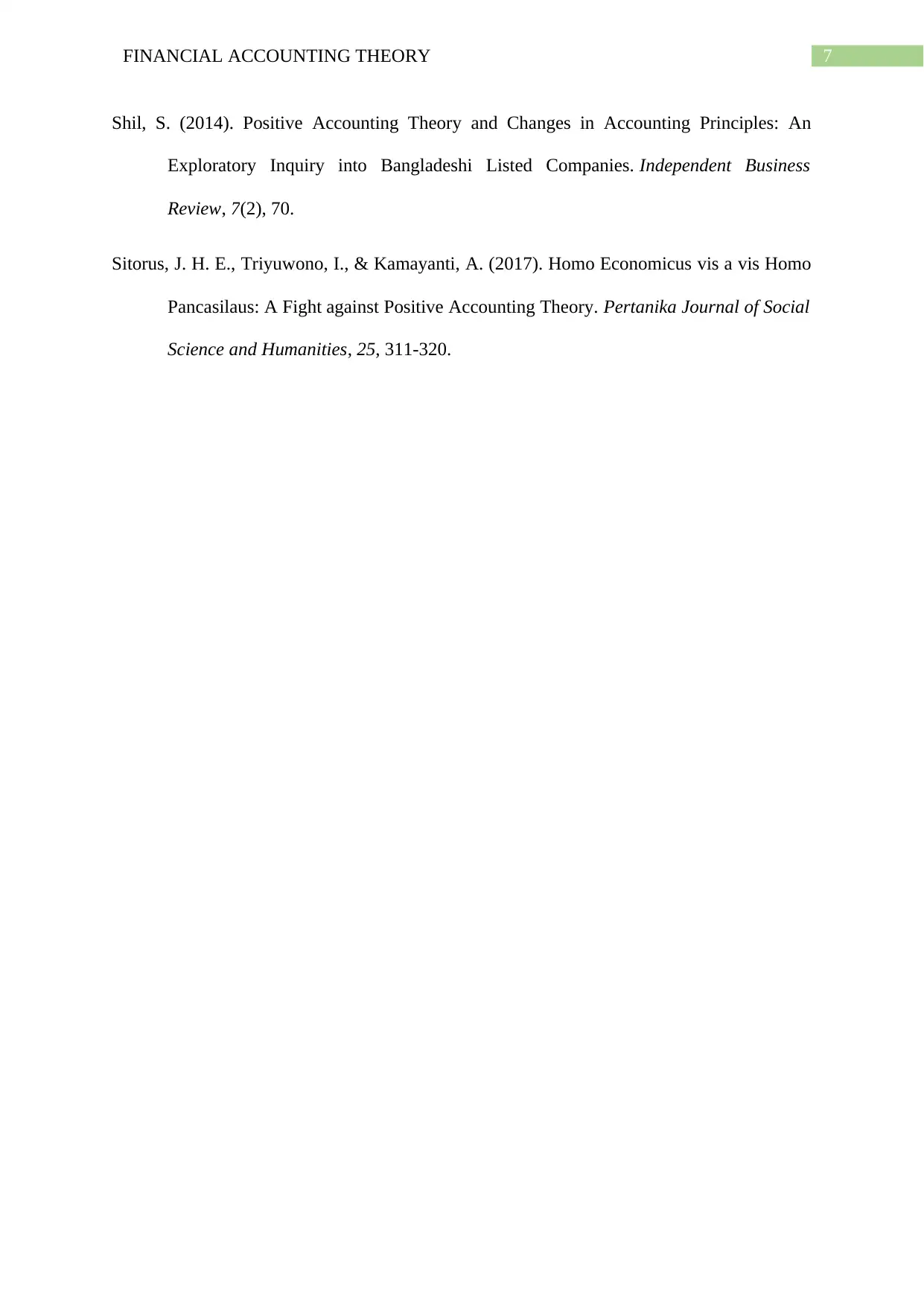
7FINANCIAL ACCOUNTING THEORY
Shil, S. (2014). Positive Accounting Theory and Changes in Accounting Principles: An
Exploratory Inquiry into Bangladeshi Listed Companies. Independent Business
Review, 7(2), 70.
Sitorus, J. H. E., Triyuwono, I., & Kamayanti, A. (2017). Homo Economicus vis a vis Homo
Pancasilaus: A Fight against Positive Accounting Theory. Pertanika Journal of Social
Science and Humanities, 25, 311-320.
Shil, S. (2014). Positive Accounting Theory and Changes in Accounting Principles: An
Exploratory Inquiry into Bangladeshi Listed Companies. Independent Business
Review, 7(2), 70.
Sitorus, J. H. E., Triyuwono, I., & Kamayanti, A. (2017). Homo Economicus vis a vis Homo
Pancasilaus: A Fight against Positive Accounting Theory. Pertanika Journal of Social
Science and Humanities, 25, 311-320.
1 out of 8
Related Documents
Your All-in-One AI-Powered Toolkit for Academic Success.
+13062052269
info@desklib.com
Available 24*7 on WhatsApp / Email
![[object Object]](/_next/static/media/star-bottom.7253800d.svg)
Unlock your academic potential
Copyright © 2020–2026 A2Z Services. All Rights Reserved. Developed and managed by ZUCOL.





